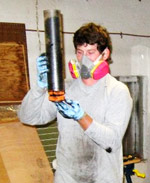James Pomfret is a Bachelor of Science student, majoring in Animal Biology. The Newsroom asked James about doing undergraduate research at TRU.
TRU: Your project is titled, “Linking Population Declines with Diet Quality in Vaux’s Swifts”. Boil it down for us.
JP: I wanted to examine diet as a potential factor in the Vaux’s Swift population declines. Because these birds sleep together inside of chimneys while migrating, I was able to take a core sample out of the guano pile which forms at the base of their roost. I then separated my core sample into layers to see what the birds have been eating over time, looking for any changes to their diet which correlated with their declining population. Yes, I picked through bird poop for six months.
TRU: What attracted you to the research?
JP: I guess it’s a drive to do something no one else has done before, kind of pioneer something. There’s no lab manual or instruction package for a project you and your supervisor come up with. You start with a question you’d like to answer, brainstorm some ideas of how to go about answering that question, and from then on it’s trial and error until you find enough information to answer your question. In my case, after a year of research I ended up with more questions than answers by the time I’d finished, and after all that I still didn’t have a full answer for my first question.
Read more Q & A’s
Rolena DeBruyn, Ecology and Environmental Biology
Tingting Li, Tourism Management
Ashley Morrison, Animal Biology
Steven Holm, Finance and Economics
Paige Hegadoren, Physics
Tamara Bandet, Microbiology
Timothy Crowe, Microbiology
Sara Burchnall, Economics and Accounting
Katie DeGroot, Ecology and Environmental Biology
TRU: You received an Undergraduate Research Experience Award Program (UREAP) grant. How did you use it?
JP: I used my grant money for travel expenses and conference fees. I had to get to Vancouver Island, which is several ferries and quite a bit of gas, in order to get my samples. This August is the North American Ornithologists Conference, which I’ll be attending and presenting my research.
TRU: Have you completed your research?
JP: My research is “completed” in the sense that my part in it is more or less finished. I sampled one chimney, and through my analysis of the samples found results which showed a decline in diet quality over time. To say the project is completed, however, would be false, because with each new-found result springs a new question. For us, we want more chimneys in different locations. Maybe the diet quality is declining in other places, or increasing in some, and maybe there are different local population changes which can be linked to diet quality at a local scale. It will be hard to ever say this project is truly finished.
TRU: Will your project lead to a presentation or publishing opportunity?
JP: I presented my research at the TRU Undergraduate Research Conference last April. I created a poster for display and gave an oral presentation aided with overhead slides. I’ll also be doing another poster presentation at the North American Ornithological Conference, which happens to be in Vancouver this year. My supervisor, Dr. Matt Reudink, and I both think the project has serious potential for publication as well. Insect identification was a major time consumer, and on the graduation timeline I had, it got demoted. I may come back to TRU for some more identifying, or another student may work it into a directed studies project. With that added data, I hope to publish my results in an ornithology or conservation journal. Perhaps The Auk, The Condor, or Conservation Biology.
TRU: What do you love about research? What don’t you like about it?
JP: I really enjoyed the challenge of designing your own methods to best answer a question. I did not enjoy when those methods didn’t work. I’ve been bested by a guano pile in a roost site at Tranquille on the Lake twice now, and it still eludes me. The challenge of finding a way to successfully get the sample is enjoyable. Getting beaten by the inanimate objects I’m trying to sample is frustrating.
TRU: Who in your field do you admire and why?
JP: I admire anyone who’s done research and continues to do so. Research is incredibly rewarding, but the amount of effort and determination required for research is almost limitless, and to put in that effort time and time again in order to make a career out of it is inspiring.
TRU: What impact do you hope your research will have?
JP: I hope my research makes people realize there is more to conserving species than protecting their habitat. Don’t get me wrong, habitat conservation is incredibly important, but what is habitat? Where does it start and end? If we can only protect so much habitat, whose habitat do we protect and who do we leave out? These are very hard questions to answer. I want people to think about conservation in a broader sense. Protecting the base of a food web can benefit an entire ecosystem rather than just a select few species.
Read more from our Q & A series on undergraduate student researchers.


